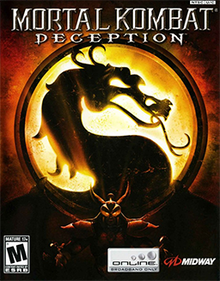| Mortal Kombat: Deception | |
|---|---|
 North American PS2 cover artwork featuring Onaga | |
| Developer(s) | Midway Games[a] |
| Publisher(s) | Midway |
| Director(s) | Ed Boon |
| Producer(s) | John Podlasek |
| Designer(s) | Ed Boon Paulo Garcia Brian LeBaron |
| Artist(s) | Steve Beran Martin Stoltz Pav Kovacic |
| Writer(s) | John Vogel Jon Greenberg Alexander Barrentine Brian Chard |
| Composer(s) | Dan Forden Chase Ashbaker Rich Carle Brian Chard |
| Series | Mortal Kombat |
| Engine | RenderWare |
| Platform(s) | Deception Unchained |
| Release | PlayStation 2 & Xbox GameCube
PlayStation Portable |
| Genre(s) | Fighting |
| Mode(s) | Single-player, multiplayer |
Mortal Kombat: Deception is a 2004 fighting game developed and published by Midway. It is the sixth main installment in the Mortal Kombat franchise and a sequel to 2002's Mortal Kombat: Deadly Alliance. It was released for the PlayStation 2 and Xbox in October 2004, for the GameCube in March 2005 and later ported for the PlayStation Portable under the title Mortal Kombat: Unchained in November 2006. Mortal Kombat: Deception follows the storyline from the fifth installment, Deadly Alliance. Its story centers on the revival of the Dragon King Onaga, who attempts to conquer the realms featured in the series after defeating the sorcerers Quan Chi and Shang Tsung, the main antagonists in the previous game, and the Thunder God Raiden, defender of Earthrealm. The surviving warriors from the previous titles join forces to confront Onaga.
Twenty-six characters are available to play in the game, with nine making their first appearance in the series. Deception contains several new features in the series, such as chess and puzzle games with the MK characters and an online mode. The Konquest Mode returns from Deadly Alliance, but follows the life of Shujinko, a warrior who is deceived by Onaga to search for artifacts to give Onaga more powers. Deception's Konquest Mode differs greatly from the Konquest Mode of Deadly Alliance, however, containing elements of open-world exploration in between story progression, rather than the Kombat Tower of Deadly Alliance.
Series co-creator Ed Boon designed Deception to be an unpredictable fighting game, and included new features such as the minigames as surprises. Several parts from Deadly Alliance such as combos and arenas were redesigned to be more realistic as well as more interactive. Deception has been well-received by video game reviewers, who praised the fights and the new features. The Konquest Mode, however, received criticism for poor voice acting. Several publications have called Deception the best fighting game of 2004.
Cite error: There are <ref group=lower-alpha> tags or {{efn}} templates on this page, but the references will not show without a {{reflist|group=lower-alpha}} template or {{notelist}} template (see the help page).